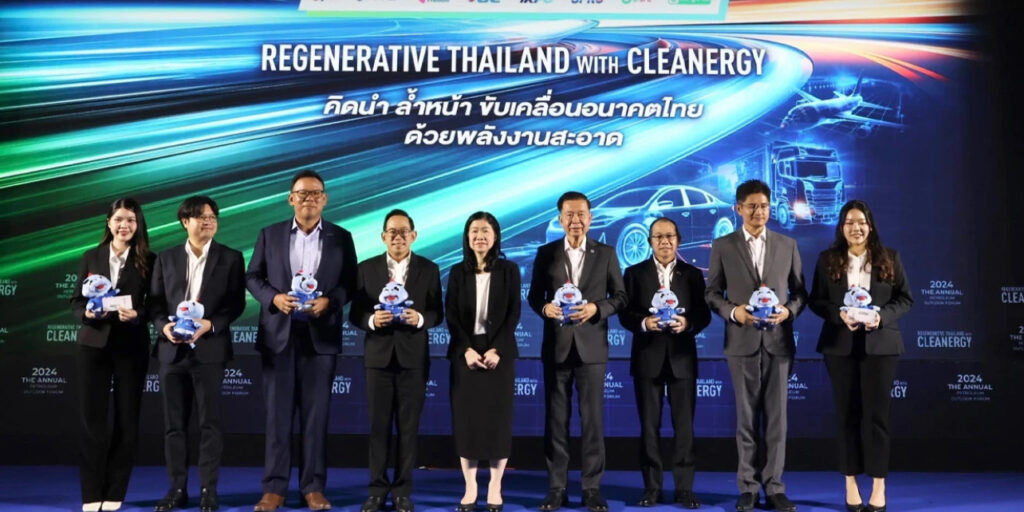Experts revealed that the global energy market is poised for increased volatility, driven by the dual pressures of climate change and geopolitical tensions at the Annual Petroleum Outlook Forum.
Hosted by Thailand’s state enterprise PTT under the theme “Regenerative Thailand with Cleanergy”, the event underscored the urgency of transitioning to clean energy while managing market uncertainties.
Speaking at PTT’s Bangkok headquarters on 21 November, CEO Kongkrapan Intarajang highlighted the critical need for ASEAN nations, including Thailand, to accelerate their shift to sustainable energy.
“The world is grappling with multiple crises, particularly global warming. Thailand must collaborate with ASEAN to transition towards clean energy,” Kongkrapan stated.
Despite efforts to expand clean energy usage, Kongkrapan acknowledged ongoing reliance on traditional energy sources. “Natural gas, being cleaner than other fossil fuels, and coal will continue to play significant roles,” he said.
He outlined PTT’s strategy to reduce carbon emissions, including hydrogen blending and carbon capture and storage (CCS) technologies. Small nuclear reactors, he added, could be pivotal for ASEAN’s renewable energy future, enhancing quality of life in the region.
Kriengkrai Thiennukul, chairman of the Federation of Thai Industries (FTI), raised concerns over the potential impact of US President-elect Donald Trump’s policies.
“Trump’s focus on protecting domestic interests could destabilise the global economy,” he warned, predicting intensified economic volatility, trade wars, and heightened competition.
Kriengkrai pointed to the ongoing US-China tech conflict, noting China’s dominance in solar and electric vehicle production.
“Geopolitical tensions could prompt manufacturers to shift operations to ASEAN, including Thailand,” he said, though he expects Thailand’s trade deficit with China to rise to 1.5 trillion baht this year.
Trump’s energy policies could further disrupt global markets, including boosting fossil fuel production and delaying clean energy investments. “His unpredictable stance on the Russia-Ukraine conflict adds another layer of uncertainty,” Kriengkrai added.
During the “Future Energy Thailand” panel, Wattanapong Kurovat, director of the Energy Policy and Planning Office, reaffirmed the government’s commitment to energy security and reducing greenhouse gas emissions.
He emphasised plans to increase renewable energy’s share in electricity production by over 10% by 2037 to meet Thailand’s net-zero target by 2065.
“Our infrastructure investments in natural gas remain crucial, but we are leveraging new technologies and energy management to cut emissions,” Wattanapong said.
He noted, however, that the rollout of Thailand’s National Energy Plan would be delayed until next year due to geopolitical developments and ongoing negotiations over the Thailand-Cambodia overlapping claims area.
Energy analysts from PTT Prism highlighted India’s emerging role as a major driver of global fuel demand, projected to surpass 75% of global consumption between 2025 and 2030.
“India’s growing working-age population, coupled with its strategic location and government-backed foreign investment, positions it as a key player,” the analysts noted.
India, currently the world’s fourth-largest fuel consumer, has seen rapid growth in its transport and industrial sectors. Despite lingering economic uncertainties, the International Monetary Fund forecasts steady global growth of 3.2% this year.
Meanwhile, China’s fuel demand is expected to rise if it can address challenges such as household debt and real estate instability. However, experts caution that global fuel prices will remain volatile due to the prolonged Russia-Ukraine conflict.
As the world navigates these challenges, the forum concluded with a call for greater international cooperation to secure a more sustainable and resilient energy future.


